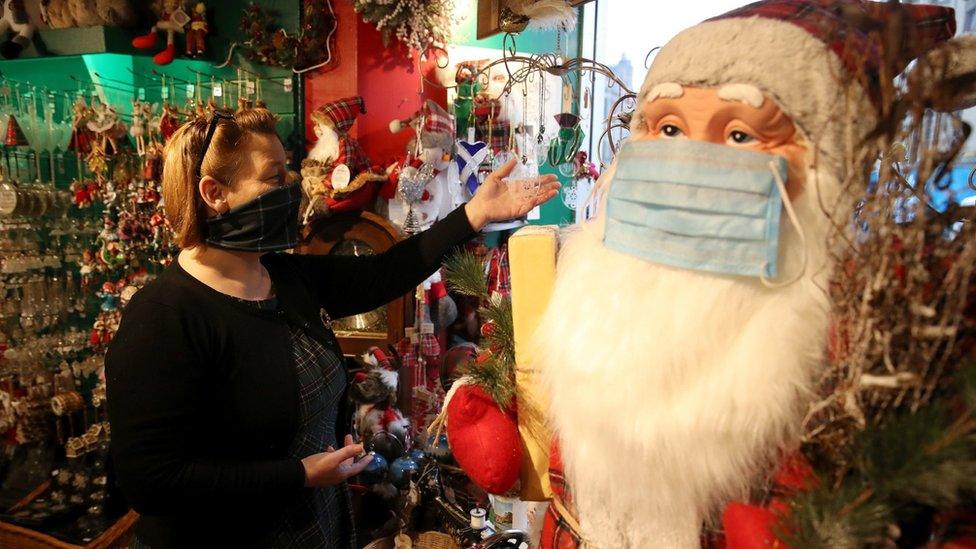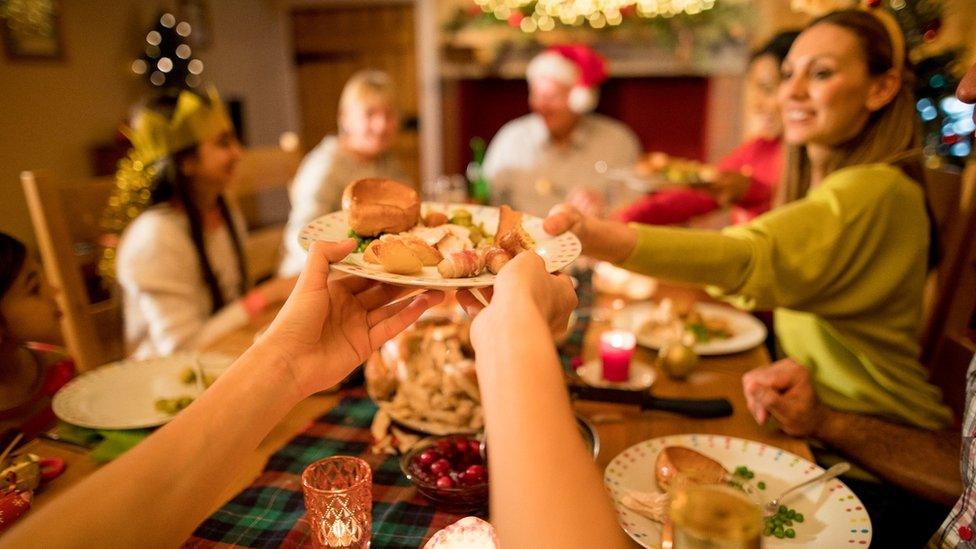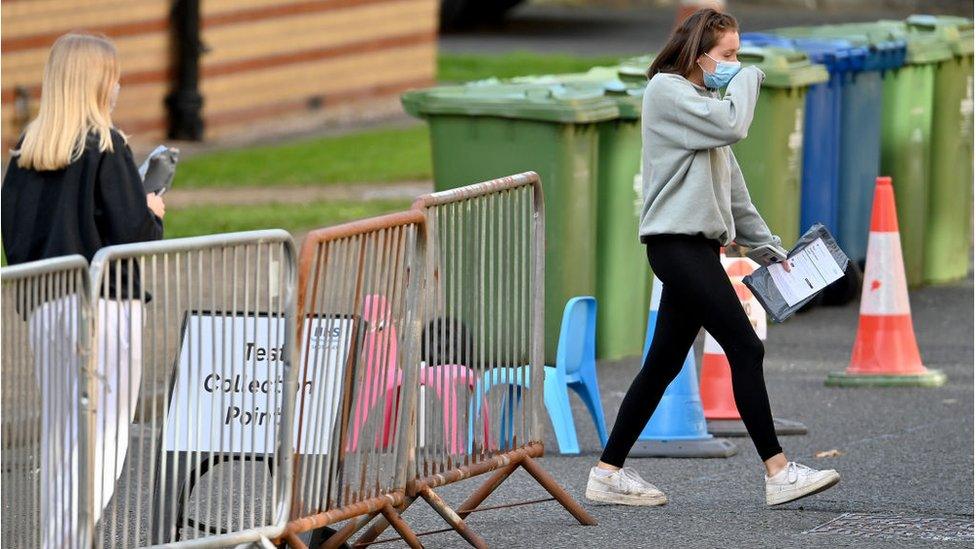Covid in Scotland: What are the latest rules on Christmas bubbles?
- Published

The Scottish government has updated its guidance on forming household bubbles over the festive period, external.
It was originally envisaged that up to three households could form a "Christmas bubble" between 23 and 27 December - but with a new strain of Covid spreading more rapidly, that relaxation has been dramatically scaled back.
What is a bubble?
The current Covid rules will now be relaxed for Christmas Day only, not the five day window that was previously announced.
By law a maximum of eight people from three households can meet up - although fewer numbers are recommended.
The Scottish government advises spending the festive period at home with members of your own household.
Children under the age of 12 do not count towards the total, and do not need to physically distance from others.
Everyone else is encouraged to keep 2m (6ft 6in) away from those outside their own household as much as possible to lower the risk of transmitting the virus.
You can only be in one Christmas bubble, and cannot change to a different one.
The government says anyone thinking of creating a bubble should carefully consider the risks. It stresses that people do not have to meet other people or feel pressured to spend Christmas with another household.
The advice is to keep in touch using technology wherever you can, and to gather outside if possible. For example, go for a walk rather than having a meal together.
Those in extended households can form a bubble, but it can only contain one extended household.
Where parents do not live in the same household, children can still move between their homes if they are in different bubbles.
Where can we meet?

Those in a bubble can only gather in a private home, outdoors or at a place of worship - but should minimise the length of time spent with the bubble, especially indoors.
If you are meeting in someone's home it is recommended that you:
open a door or window to let in as much fresh air as you can, both during and after a visit
keep 2m away from people not in your usual household
wash your hands frequently
regularly clean touch points, such as door handles and surfaces
avoid sharing cutlery or crockery if possible
People should not mix with other households elsewhere. If you are going to a pub, restaurant or a leisure or entertainment venue, you must do this with your own household.
The opening hours for hospitality venues will follow the rules which apply in that area at the time.
The government says people in a bubble should not stay in tourist accommodation together as a group.
What about travel?
Travel within Scotland will be allowed on Christmas Day, but the advice is to stay as local as possible.
You must travel and return home on 25 December, and can only travel to meet those within your Christmas bubble.
It is illegal to travel to and from other parts of the UK over the festive period unless you qualify for one of the specific exemptions.
From Boxing Day all of mainland Scotland will be in level four and some islands in level three - meaning people should not leave their local authority area except for essential reasons.
The Scottish government is strongly advising people not to travel overseas. From Boxing Day, non-essential travel in and out of Scotland will be prohibited.
What about students and shared accommodation?

Under the plans students will be tested twice five days apart
Students who return home at the end of term will be part of the household they have returned to. Plans are already in place to allow students return home over Christmas if they return two negative Covid-19 tests.
People other than students who live in a shared flat or house are considered a household.
The government is urging them not to split up and enter separate bubbles over the festive period.
If people are joining different bubbles, they should isolate from their flatmates for about a week both before and after joining the bubble.
What is the advice for vulnerable people?
The government says anyone who has previously been advised to shield because they are at highest clinical risk from Covid-19 should "take time to think" about forming a bubble because it would bring greater risks.
It says people should not feel pressured to enter an environment which makes them anxious.
People can still go into another household to provide care and support for a vulnerable person.
However, if you visit someone in a hospital, hospice or care home the government says the safest way to spend Christmas would be not to form a bubble with another household.
That is because doing so would increase the risk of being exposed to Covid-19 and passing it on to other people, and those in care homes, hospitals and hospices can be particularly vulnerable.
What happens if someone develops symptoms?
If someone in a bubble develops Covid-19 symptoms, everyone within the bubble must isolate immediately if they met that person any time between two days before and 10 days after their symptoms started.
If that person tests positive, all members of the bubble must self-isolate for 10 days from the start of symptoms or their most recent contact.
What about the other nations?
In England, plans to allow people to meet up for Christmas have been scrapped for London and the south east which have moved into a new tier four level of restrictions.
Elsewhere in England - across tiers one to three - the plan to allow "Christmas bubbles" from 23 to 27 December is being changed to Christmas Day only.
A new national lockdown in Wales began on Sunday 20 December. Bubbles of more than two households can meet on Christmas Day only.
In Northern Ireland a new six-week lockdown begins on Boxing Day.
People will only be able to form a Christmas bubble on one day between 23 and 27 December, so there is flexibility for those working on Christmas Day.


Use the form below to send us your questions and we could be in touch.
In some cases your question will be published, displaying your name and location as you provide it, unless you state otherwise. Your contact details will never be published. Please ensure you have read the terms and conditions.
If you are reading this page on the BBC News app, you will need to visit the mobile version of the BBC website to submit your question on this topic.


